Gibbs Reflective Cycle in Personal and Professional Development
VerifiedAdded on 2023/06/07
|8
|2356
|164
Report
AI Summary
This report explores personal and professional development through the lens of the Gibbs Reflective Cycle, detailing a student's experience working in a team. The report outlines the six stages of the Gibbs model—Description, Feelings, Evaluation, Analysis, Conclusion, and Action Plan—to analyze a group assignment. The student reflects on the initial division of work, the challenges faced due to differing writing styles, and the eventual success achieved through teamwork and communication. Key learnings include the importance of planning, understanding team member strengths, and addressing concerns openly. The report concludes that personal and professional development is essential for students to enhance their skills, set goals, and maximize their potential, emphasizing the value of teamwork, effective communication, and continuous self-improvement.
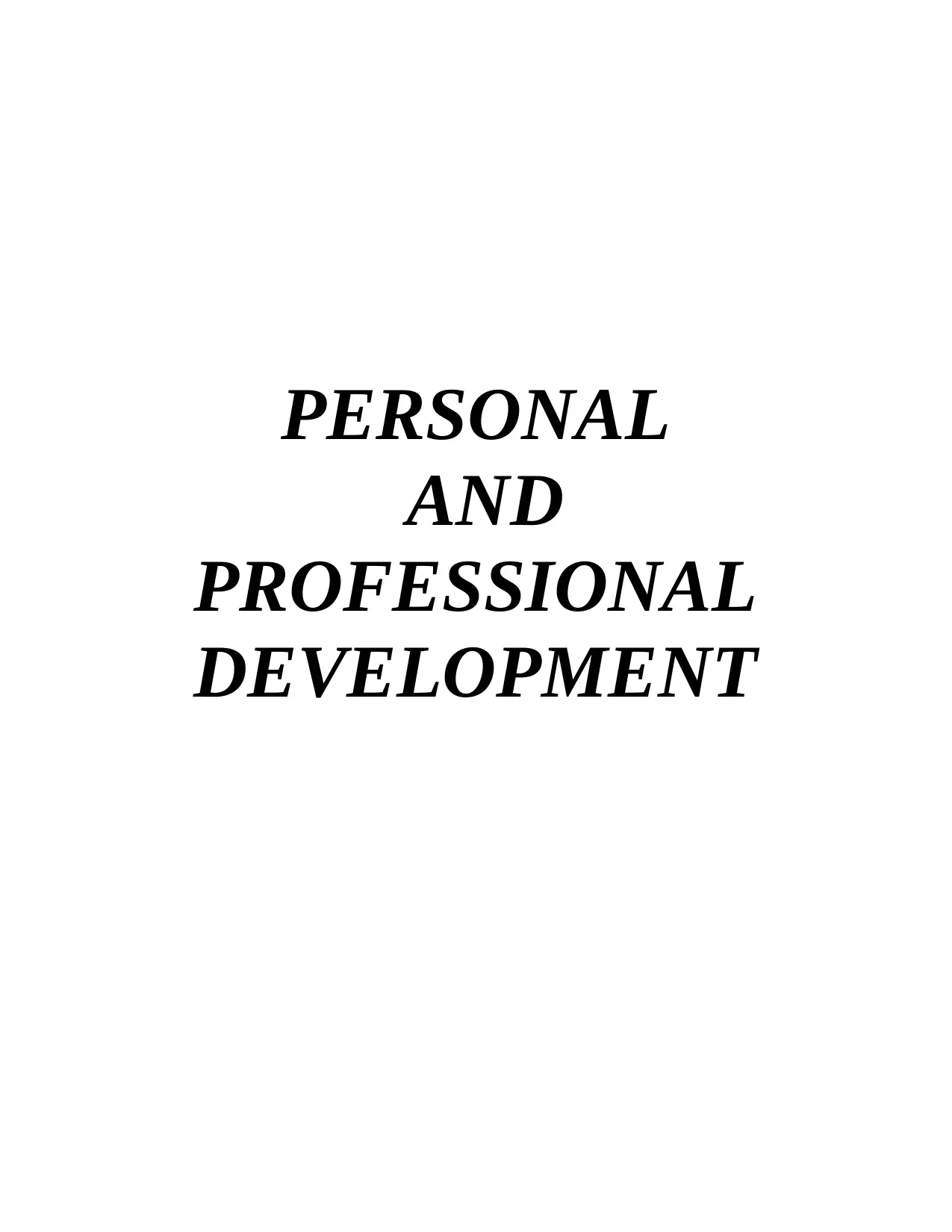
PERSONAL
AND
PROFESSIONAL
DEVELOPMENT
AND
PROFESSIONAL
DEVELOPMENT
Paraphrase This Document
Need a fresh take? Get an instant paraphrase of this document with our AI Paraphraser
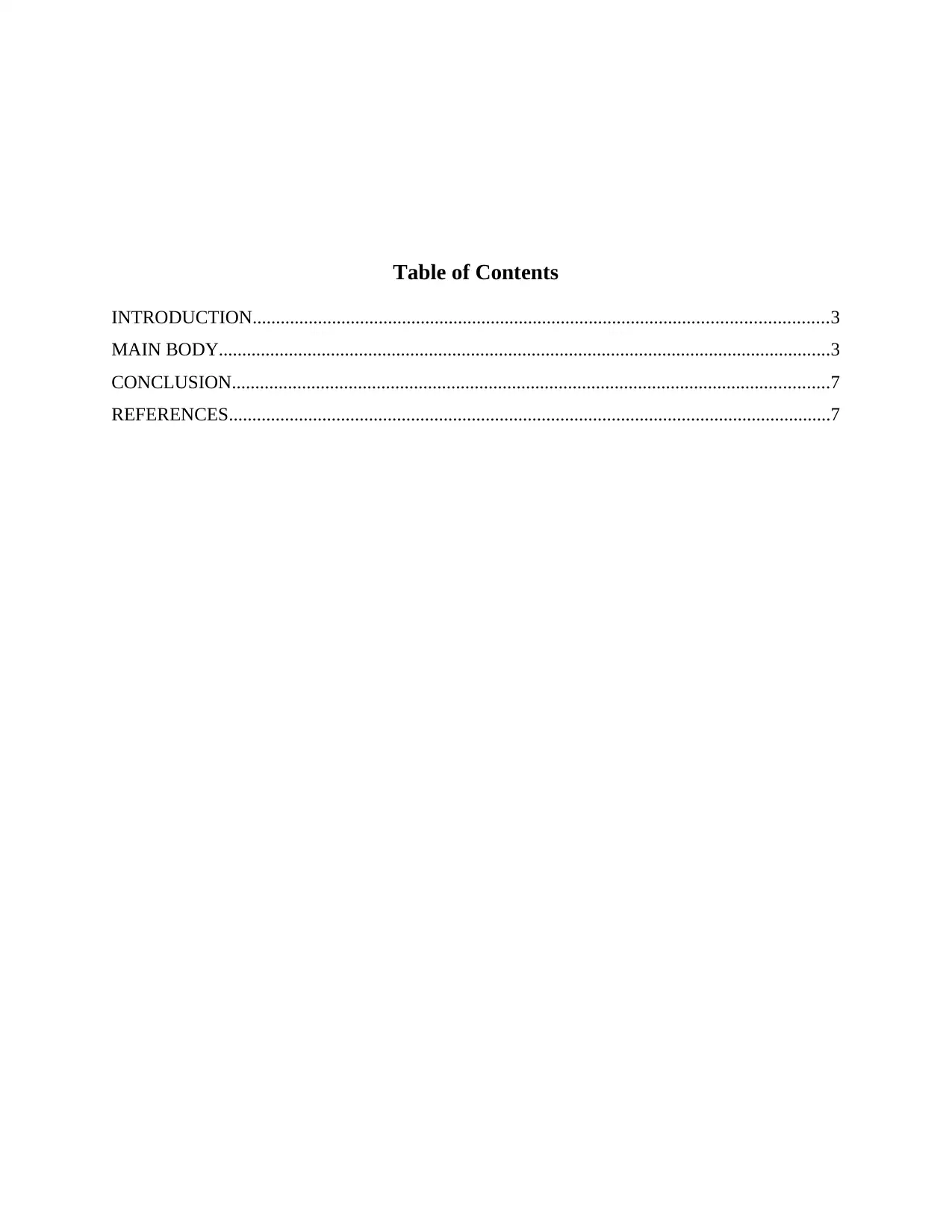
Table of Contents
INTRODUCTION...........................................................................................................................3
MAIN BODY...................................................................................................................................3
CONCLUSION................................................................................................................................7
REFERENCES.................................................................................................................................7
INTRODUCTION...........................................................................................................................3
MAIN BODY...................................................................................................................................3
CONCLUSION................................................................................................................................7
REFERENCES.................................................................................................................................7
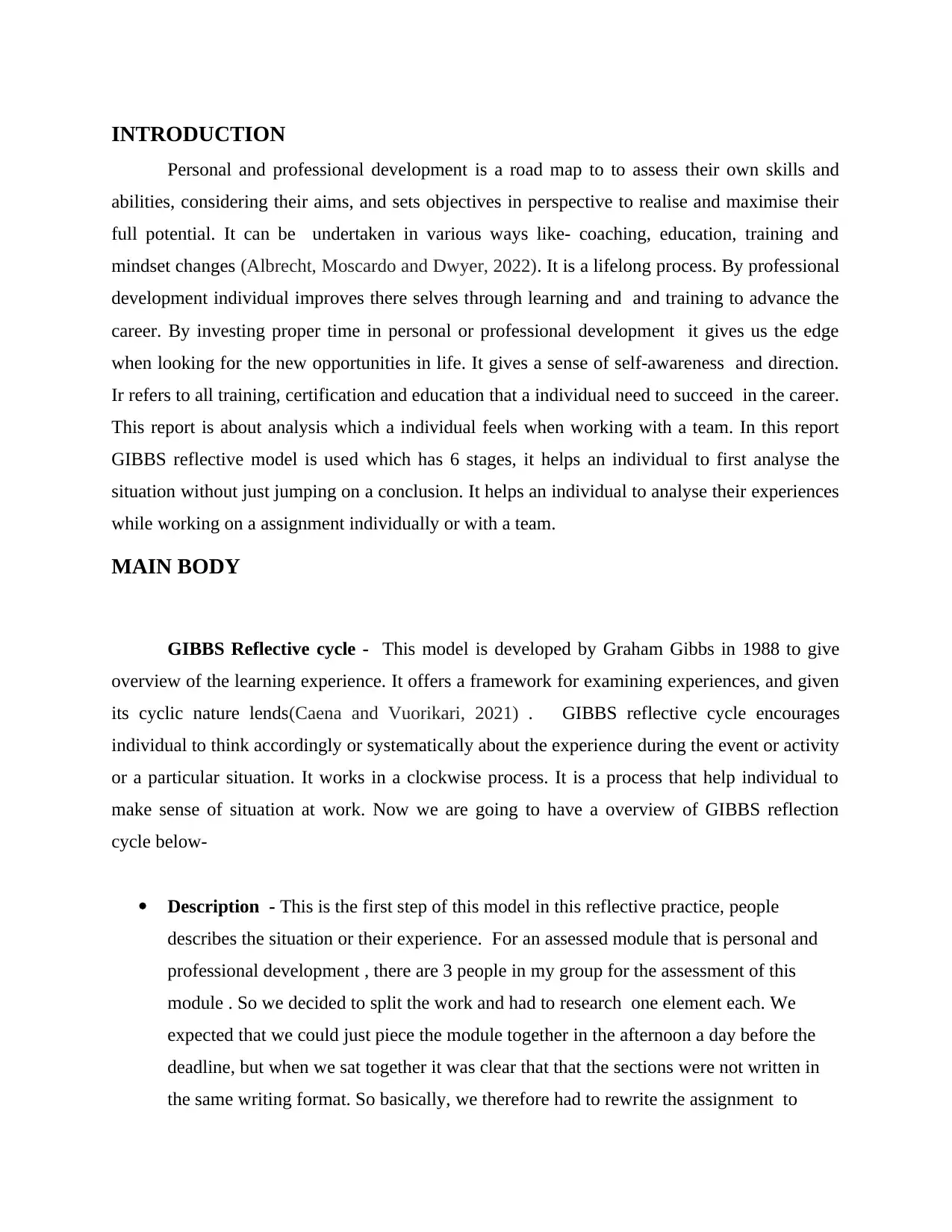
INTRODUCTION
Personal and professional development is a road map to to assess their own skills and
abilities, considering their aims, and sets objectives in perspective to realise and maximise their
full potential. It can be undertaken in various ways like- coaching, education, training and
mindset changes (Albrecht, Moscardo and Dwyer, 2022). It is a lifelong process. By professional
development individual improves there selves through learning and and training to advance the
career. By investing proper time in personal or professional development it gives us the edge
when looking for the new opportunities in life. It gives a sense of self-awareness and direction.
Ir refers to all training, certification and education that a individual need to succeed in the career.
This report is about analysis which a individual feels when working with a team. In this report
GIBBS reflective model is used which has 6 stages, it helps an individual to first analyse the
situation without just jumping on a conclusion. It helps an individual to analyse their experiences
while working on a assignment individually or with a team.
MAIN BODY
GIBBS Reflective cycle - This model is developed by Graham Gibbs in 1988 to give
overview of the learning experience. It offers a framework for examining experiences, and given
its cyclic nature lends(Caena and Vuorikari, 2021) . GIBBS reflective cycle encourages
individual to think accordingly or systematically about the experience during the event or activity
or a particular situation. It works in a clockwise process. It is a process that help individual to
make sense of situation at work. Now we are going to have a overview of GIBBS reflection
cycle below-
Description - This is the first step of this model in this reflective practice, people
describes the situation or their experience. For an assessed module that is personal and
professional development , there are 3 people in my group for the assessment of this
module . So we decided to split the work and had to research one element each. We
expected that we could just piece the module together in the afternoon a day before the
deadline, but when we sat together it was clear that that the sections were not written in
the same writing format. So basically, we therefore had to rewrite the assignment to
Personal and professional development is a road map to to assess their own skills and
abilities, considering their aims, and sets objectives in perspective to realise and maximise their
full potential. It can be undertaken in various ways like- coaching, education, training and
mindset changes (Albrecht, Moscardo and Dwyer, 2022). It is a lifelong process. By professional
development individual improves there selves through learning and and training to advance the
career. By investing proper time in personal or professional development it gives us the edge
when looking for the new opportunities in life. It gives a sense of self-awareness and direction.
Ir refers to all training, certification and education that a individual need to succeed in the career.
This report is about analysis which a individual feels when working with a team. In this report
GIBBS reflective model is used which has 6 stages, it helps an individual to first analyse the
situation without just jumping on a conclusion. It helps an individual to analyse their experiences
while working on a assignment individually or with a team.
MAIN BODY
GIBBS Reflective cycle - This model is developed by Graham Gibbs in 1988 to give
overview of the learning experience. It offers a framework for examining experiences, and given
its cyclic nature lends(Caena and Vuorikari, 2021) . GIBBS reflective cycle encourages
individual to think accordingly or systematically about the experience during the event or activity
or a particular situation. It works in a clockwise process. It is a process that help individual to
make sense of situation at work. Now we are going to have a overview of GIBBS reflection
cycle below-
Description - This is the first step of this model in this reflective practice, people
describes the situation or their experience. For an assessed module that is personal and
professional development , there are 3 people in my group for the assessment of this
module . So we decided to split the work and had to research one element each. We
expected that we could just piece the module together in the afternoon a day before the
deadline, but when we sat together it was clear that that the sections were not written in
the same writing format. So basically, we therefore had to rewrite the assignment to
⊘ This is a preview!⊘
Do you want full access?
Subscribe today to unlock all pages.

Trusted by 1+ million students worldwide
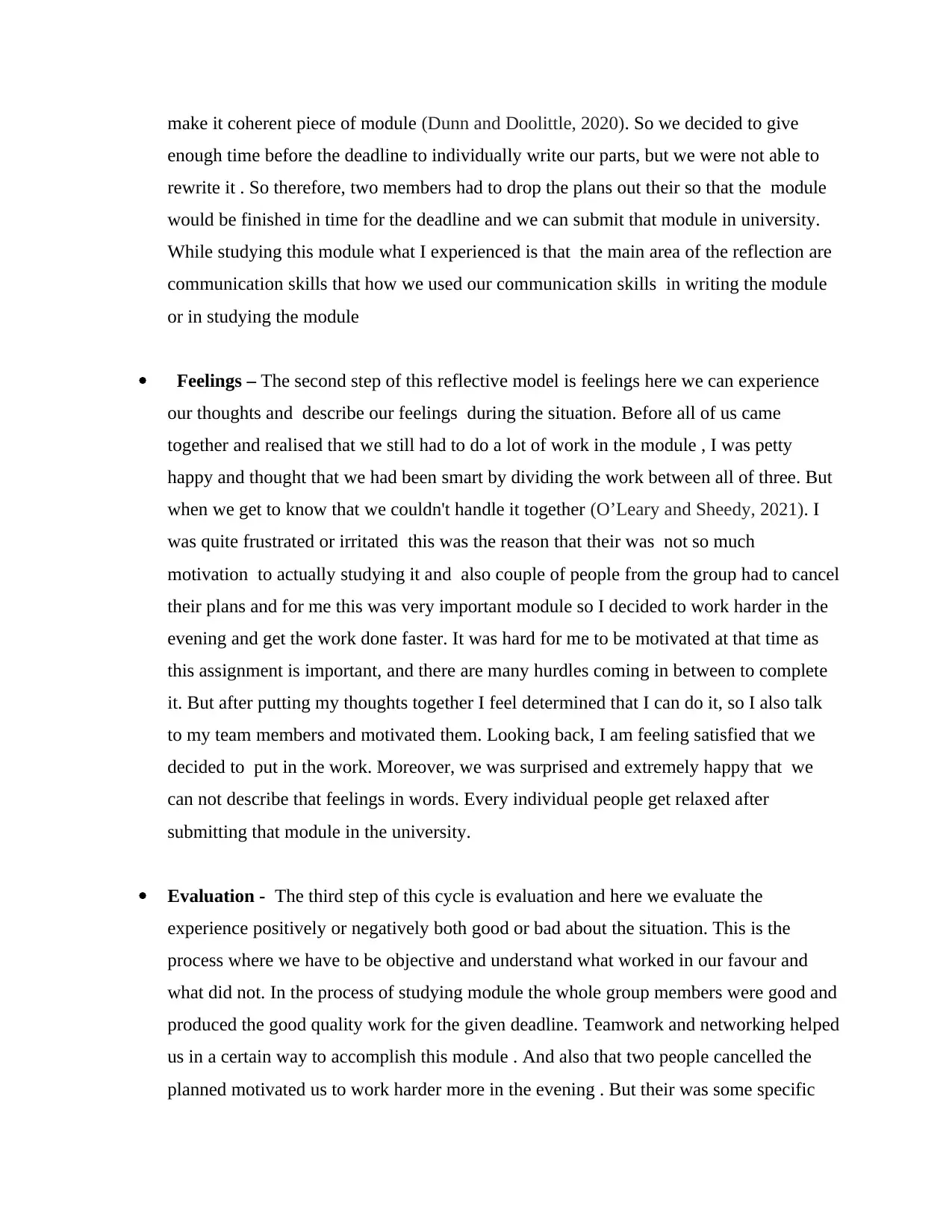
make it coherent piece of module (Dunn and Doolittle, 2020). So we decided to give
enough time before the deadline to individually write our parts, but we were not able to
rewrite it . So therefore, two members had to drop the plans out their so that the module
would be finished in time for the deadline and we can submit that module in university.
While studying this module what I experienced is that the main area of the reflection are
communication skills that how we used our communication skills in writing the module
or in studying the module
Feelings – The second step of this reflective model is feelings here we can experience
our thoughts and describe our feelings during the situation. Before all of us came
together and realised that we still had to do a lot of work in the module , I was petty
happy and thought that we had been smart by dividing the work between all of three. But
when we get to know that we couldn't handle it together (O’Leary and Sheedy, 2021). I
was quite frustrated or irritated this was the reason that their was not so much
motivation to actually studying it and also couple of people from the group had to cancel
their plans and for me this was very important module so I decided to work harder in the
evening and get the work done faster. It was hard for me to be motivated at that time as
this assignment is important, and there are many hurdles coming in between to complete
it. But after putting my thoughts together I feel determined that I can do it, so I also talk
to my team members and motivated them. Looking back, I am feeling satisfied that we
decided to put in the work. Moreover, we was surprised and extremely happy that we
can not describe that feelings in words. Every individual people get relaxed after
submitting that module in the university.
Evaluation - The third step of this cycle is evaluation and here we evaluate the
experience positively or negatively both good or bad about the situation. This is the
process where we have to be objective and understand what worked in our favour and
what did not. In the process of studying module the whole group members were good and
produced the good quality work for the given deadline. Teamwork and networking helped
us in a certain way to accomplish this module . And also that two people cancelled the
planned motivated us to work harder more in the evening . But their was some specific
enough time before the deadline to individually write our parts, but we were not able to
rewrite it . So therefore, two members had to drop the plans out their so that the module
would be finished in time for the deadline and we can submit that module in university.
While studying this module what I experienced is that the main area of the reflection are
communication skills that how we used our communication skills in writing the module
or in studying the module
Feelings – The second step of this reflective model is feelings here we can experience
our thoughts and describe our feelings during the situation. Before all of us came
together and realised that we still had to do a lot of work in the module , I was petty
happy and thought that we had been smart by dividing the work between all of three. But
when we get to know that we couldn't handle it together (O’Leary and Sheedy, 2021). I
was quite frustrated or irritated this was the reason that their was not so much
motivation to actually studying it and also couple of people from the group had to cancel
their plans and for me this was very important module so I decided to work harder in the
evening and get the work done faster. It was hard for me to be motivated at that time as
this assignment is important, and there are many hurdles coming in between to complete
it. But after putting my thoughts together I feel determined that I can do it, so I also talk
to my team members and motivated them. Looking back, I am feeling satisfied that we
decided to put in the work. Moreover, we was surprised and extremely happy that we
can not describe that feelings in words. Every individual people get relaxed after
submitting that module in the university.
Evaluation - The third step of this cycle is evaluation and here we evaluate the
experience positively or negatively both good or bad about the situation. This is the
process where we have to be objective and understand what worked in our favour and
what did not. In the process of studying module the whole group members were good and
produced the good quality work for the given deadline. Teamwork and networking helped
us in a certain way to accomplish this module . And also that two people cancelled the
planned motivated us to work harder more in the evening . But their was some specific
Paraphrase This Document
Need a fresh take? Get an instant paraphrase of this document with our AI Paraphraser
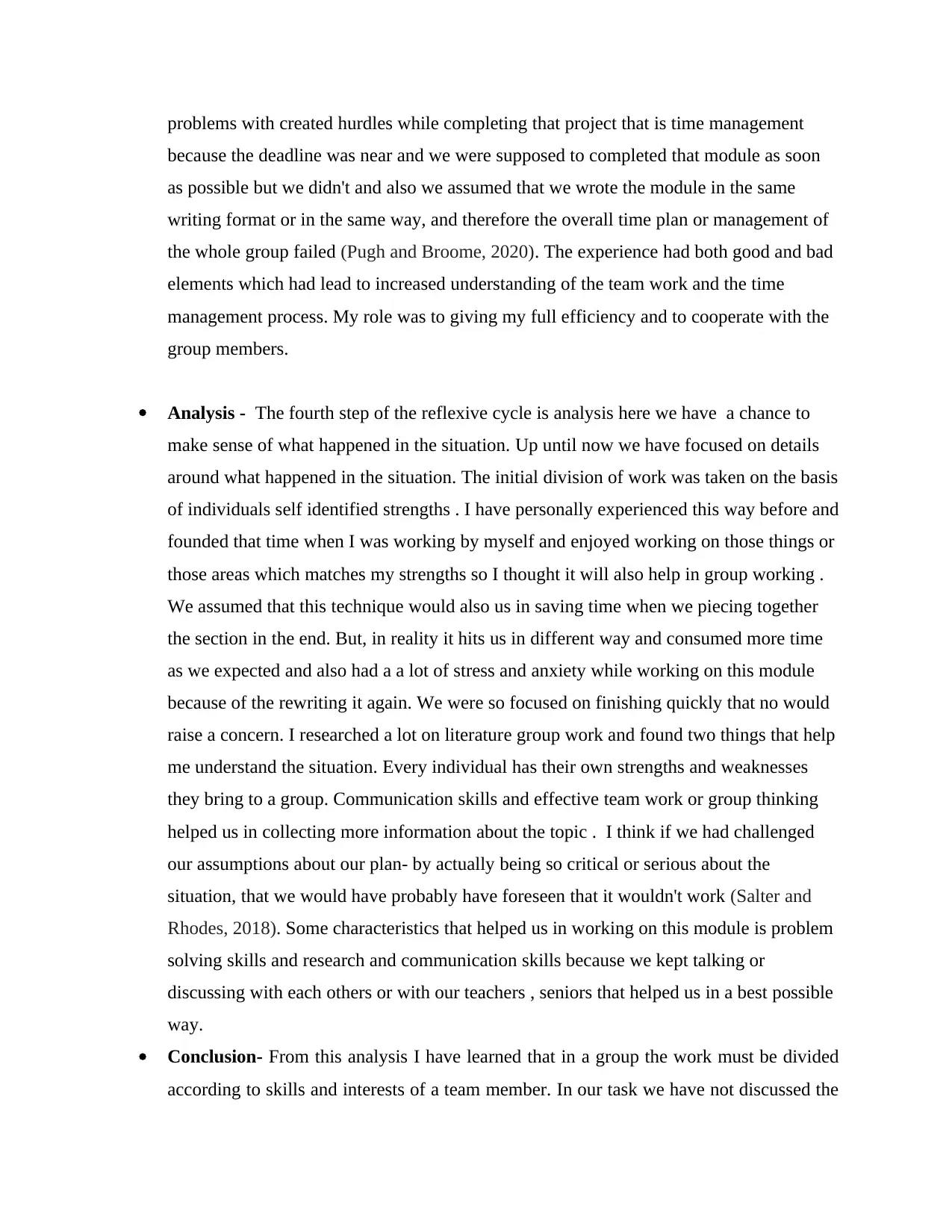
problems with created hurdles while completing that project that is time management
because the deadline was near and we were supposed to completed that module as soon
as possible but we didn't and also we assumed that we wrote the module in the same
writing format or in the same way, and therefore the overall time plan or management of
the whole group failed (Pugh and Broome, 2020). The experience had both good and bad
elements which had lead to increased understanding of the team work and the time
management process. My role was to giving my full efficiency and to cooperate with the
group members.
Analysis - The fourth step of the reflexive cycle is analysis here we have a chance to
make sense of what happened in the situation. Up until now we have focused on details
around what happened in the situation. The initial division of work was taken on the basis
of individuals self identified strengths . I have personally experienced this way before and
founded that time when I was working by myself and enjoyed working on those things or
those areas which matches my strengths so I thought it will also help in group working .
We assumed that this technique would also us in saving time when we piecing together
the section in the end. But, in reality it hits us in different way and consumed more time
as we expected and also had a a lot of stress and anxiety while working on this module
because of the rewriting it again. We were so focused on finishing quickly that no would
raise a concern. I researched a lot on literature group work and found two things that help
me understand the situation. Every individual has their own strengths and weaknesses
they bring to a group. Communication skills and effective team work or group thinking
helped us in collecting more information about the topic . I think if we had challenged
our assumptions about our plan- by actually being so critical or serious about the
situation, that we would have probably have foreseen that it wouldn't work (Salter and
Rhodes, 2018). Some characteristics that helped us in working on this module is problem
solving skills and research and communication skills because we kept talking or
discussing with each others or with our teachers , seniors that helped us in a best possible
way.
Conclusion- From this analysis I have learned that in a group the work must be divided
according to skills and interests of a team member. In our task we have not discussed the
because the deadline was near and we were supposed to completed that module as soon
as possible but we didn't and also we assumed that we wrote the module in the same
writing format or in the same way, and therefore the overall time plan or management of
the whole group failed (Pugh and Broome, 2020). The experience had both good and bad
elements which had lead to increased understanding of the team work and the time
management process. My role was to giving my full efficiency and to cooperate with the
group members.
Analysis - The fourth step of the reflexive cycle is analysis here we have a chance to
make sense of what happened in the situation. Up until now we have focused on details
around what happened in the situation. The initial division of work was taken on the basis
of individuals self identified strengths . I have personally experienced this way before and
founded that time when I was working by myself and enjoyed working on those things or
those areas which matches my strengths so I thought it will also help in group working .
We assumed that this technique would also us in saving time when we piecing together
the section in the end. But, in reality it hits us in different way and consumed more time
as we expected and also had a a lot of stress and anxiety while working on this module
because of the rewriting it again. We were so focused on finishing quickly that no would
raise a concern. I researched a lot on literature group work and found two things that help
me understand the situation. Every individual has their own strengths and weaknesses
they bring to a group. Communication skills and effective team work or group thinking
helped us in collecting more information about the topic . I think if we had challenged
our assumptions about our plan- by actually being so critical or serious about the
situation, that we would have probably have foreseen that it wouldn't work (Salter and
Rhodes, 2018). Some characteristics that helped us in working on this module is problem
solving skills and research and communication skills because we kept talking or
discussing with each others or with our teachers , seniors that helped us in a best possible
way.
Conclusion- From this analysis I have learned that in a group the work must be divided
according to skills and interests of a team member. In our task we have not discussed the
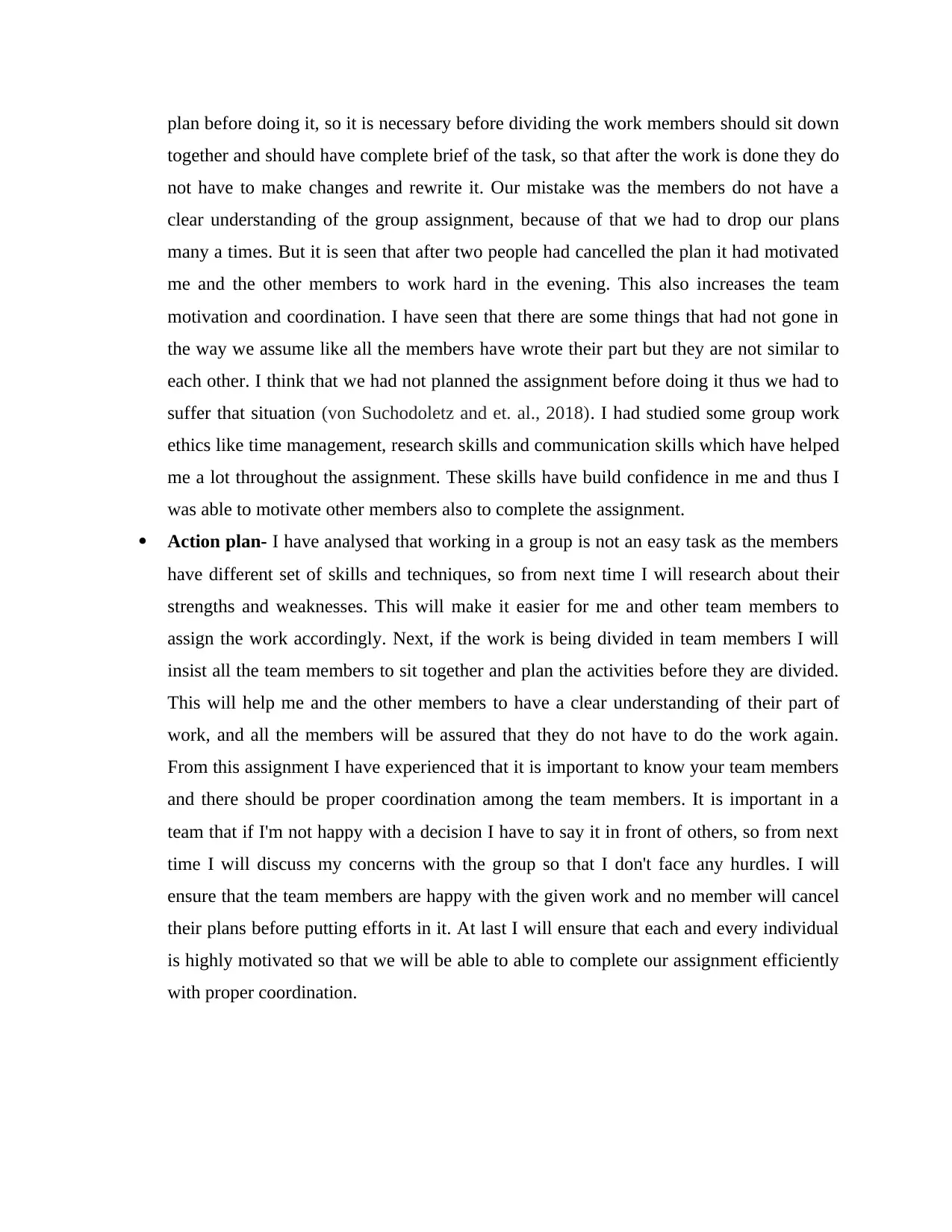
plan before doing it, so it is necessary before dividing the work members should sit down
together and should have complete brief of the task, so that after the work is done they do
not have to make changes and rewrite it. Our mistake was the members do not have a
clear understanding of the group assignment, because of that we had to drop our plans
many a times. But it is seen that after two people had cancelled the plan it had motivated
me and the other members to work hard in the evening. This also increases the team
motivation and coordination. I have seen that there are some things that had not gone in
the way we assume like all the members have wrote their part but they are not similar to
each other. I think that we had not planned the assignment before doing it thus we had to
suffer that situation (von Suchodoletz and et. al., 2018). I had studied some group work
ethics like time management, research skills and communication skills which have helped
me a lot throughout the assignment. These skills have build confidence in me and thus I
was able to motivate other members also to complete the assignment.
Action plan- I have analysed that working in a group is not an easy task as the members
have different set of skills and techniques, so from next time I will research about their
strengths and weaknesses. This will make it easier for me and other team members to
assign the work accordingly. Next, if the work is being divided in team members I will
insist all the team members to sit together and plan the activities before they are divided.
This will help me and the other members to have a clear understanding of their part of
work, and all the members will be assured that they do not have to do the work again.
From this assignment I have experienced that it is important to know your team members
and there should be proper coordination among the team members. It is important in a
team that if I'm not happy with a decision I have to say it in front of others, so from next
time I will discuss my concerns with the group so that I don't face any hurdles. I will
ensure that the team members are happy with the given work and no member will cancel
their plans before putting efforts in it. At last I will ensure that each and every individual
is highly motivated so that we will be able to able to complete our assignment efficiently
with proper coordination.
together and should have complete brief of the task, so that after the work is done they do
not have to make changes and rewrite it. Our mistake was the members do not have a
clear understanding of the group assignment, because of that we had to drop our plans
many a times. But it is seen that after two people had cancelled the plan it had motivated
me and the other members to work hard in the evening. This also increases the team
motivation and coordination. I have seen that there are some things that had not gone in
the way we assume like all the members have wrote their part but they are not similar to
each other. I think that we had not planned the assignment before doing it thus we had to
suffer that situation (von Suchodoletz and et. al., 2018). I had studied some group work
ethics like time management, research skills and communication skills which have helped
me a lot throughout the assignment. These skills have build confidence in me and thus I
was able to motivate other members also to complete the assignment.
Action plan- I have analysed that working in a group is not an easy task as the members
have different set of skills and techniques, so from next time I will research about their
strengths and weaknesses. This will make it easier for me and other team members to
assign the work accordingly. Next, if the work is being divided in team members I will
insist all the team members to sit together and plan the activities before they are divided.
This will help me and the other members to have a clear understanding of their part of
work, and all the members will be assured that they do not have to do the work again.
From this assignment I have experienced that it is important to know your team members
and there should be proper coordination among the team members. It is important in a
team that if I'm not happy with a decision I have to say it in front of others, so from next
time I will discuss my concerns with the group so that I don't face any hurdles. I will
ensure that the team members are happy with the given work and no member will cancel
their plans before putting efforts in it. At last I will ensure that each and every individual
is highly motivated so that we will be able to able to complete our assignment efficiently
with proper coordination.
⊘ This is a preview!⊘
Do you want full access?
Subscribe today to unlock all pages.

Trusted by 1+ million students worldwide
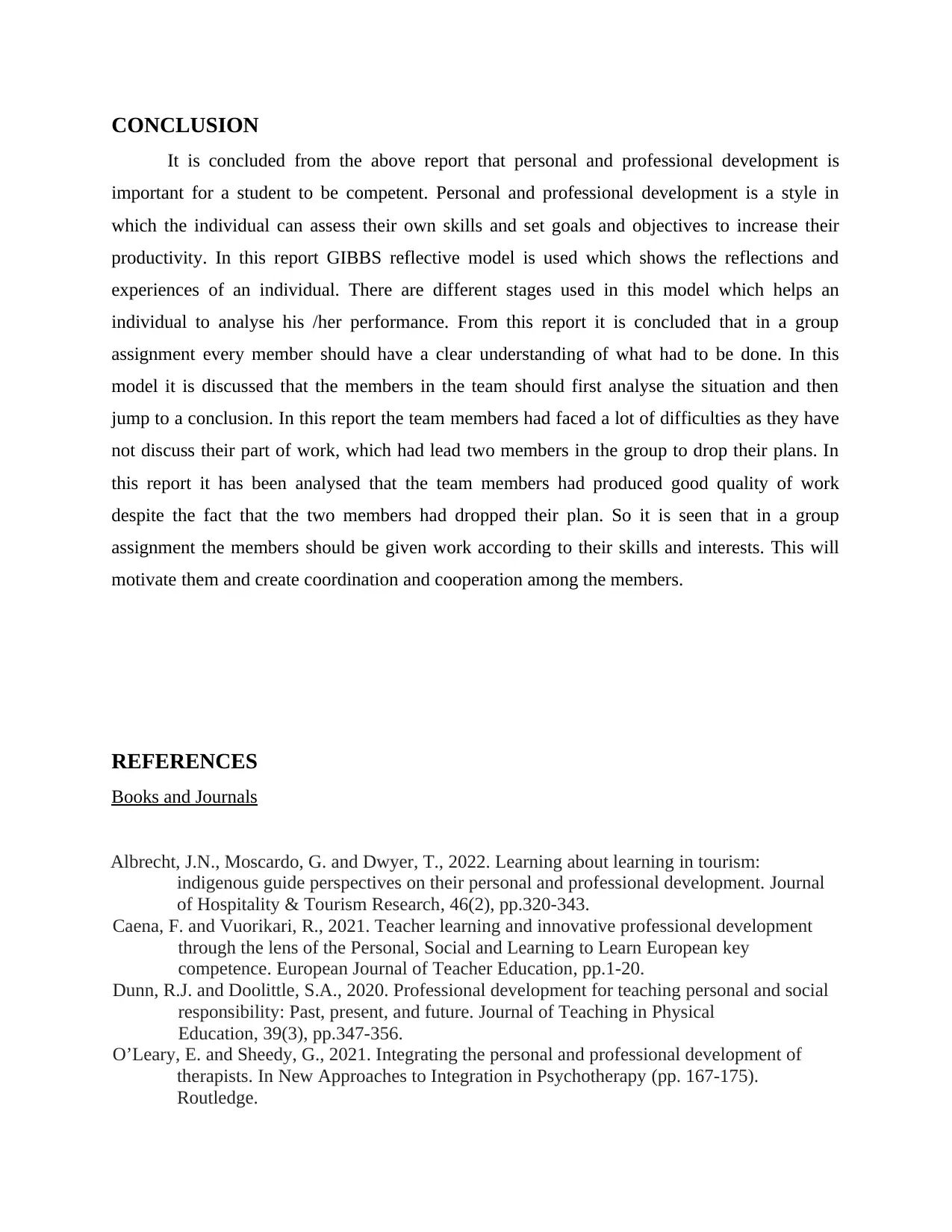
CONCLUSION
It is concluded from the above report that personal and professional development is
important for a student to be competent. Personal and professional development is a style in
which the individual can assess their own skills and set goals and objectives to increase their
productivity. In this report GIBBS reflective model is used which shows the reflections and
experiences of an individual. There are different stages used in this model which helps an
individual to analyse his /her performance. From this report it is concluded that in a group
assignment every member should have a clear understanding of what had to be done. In this
model it is discussed that the members in the team should first analyse the situation and then
jump to a conclusion. In this report the team members had faced a lot of difficulties as they have
not discuss their part of work, which had lead two members in the group to drop their plans. In
this report it has been analysed that the team members had produced good quality of work
despite the fact that the two members had dropped their plan. So it is seen that in a group
assignment the members should be given work according to their skills and interests. This will
motivate them and create coordination and cooperation among the members.
REFERENCES
Books and Journals
Albrecht, J.N., Moscardo, G. and Dwyer, T., 2022. Learning about learning in tourism:
indigenous guide perspectives on their personal and professional development. Journal
of Hospitality & Tourism Research, 46(2), pp.320-343.
Caena, F. and Vuorikari, R., 2021. Teacher learning and innovative professional development
through the lens of the Personal, Social and Learning to Learn European key
competence. European Journal of Teacher Education, pp.1-20.
Dunn, R.J. and Doolittle, S.A., 2020. Professional development for teaching personal and social
responsibility: Past, present, and future. Journal of Teaching in Physical
Education, 39(3), pp.347-356.
O’Leary, E. and Sheedy, G., 2021. Integrating the personal and professional development of
therapists. In New Approaches to Integration in Psychotherapy (pp. 167-175).
Routledge.
It is concluded from the above report that personal and professional development is
important for a student to be competent. Personal and professional development is a style in
which the individual can assess their own skills and set goals and objectives to increase their
productivity. In this report GIBBS reflective model is used which shows the reflections and
experiences of an individual. There are different stages used in this model which helps an
individual to analyse his /her performance. From this report it is concluded that in a group
assignment every member should have a clear understanding of what had to be done. In this
model it is discussed that the members in the team should first analyse the situation and then
jump to a conclusion. In this report the team members had faced a lot of difficulties as they have
not discuss their part of work, which had lead two members in the group to drop their plans. In
this report it has been analysed that the team members had produced good quality of work
despite the fact that the two members had dropped their plan. So it is seen that in a group
assignment the members should be given work according to their skills and interests. This will
motivate them and create coordination and cooperation among the members.
REFERENCES
Books and Journals
Albrecht, J.N., Moscardo, G. and Dwyer, T., 2022. Learning about learning in tourism:
indigenous guide perspectives on their personal and professional development. Journal
of Hospitality & Tourism Research, 46(2), pp.320-343.
Caena, F. and Vuorikari, R., 2021. Teacher learning and innovative professional development
through the lens of the Personal, Social and Learning to Learn European key
competence. European Journal of Teacher Education, pp.1-20.
Dunn, R.J. and Doolittle, S.A., 2020. Professional development for teaching personal and social
responsibility: Past, present, and future. Journal of Teaching in Physical
Education, 39(3), pp.347-356.
O’Leary, E. and Sheedy, G., 2021. Integrating the personal and professional development of
therapists. In New Approaches to Integration in Psychotherapy (pp. 167-175).
Routledge.
Paraphrase This Document
Need a fresh take? Get an instant paraphrase of this document with our AI Paraphraser
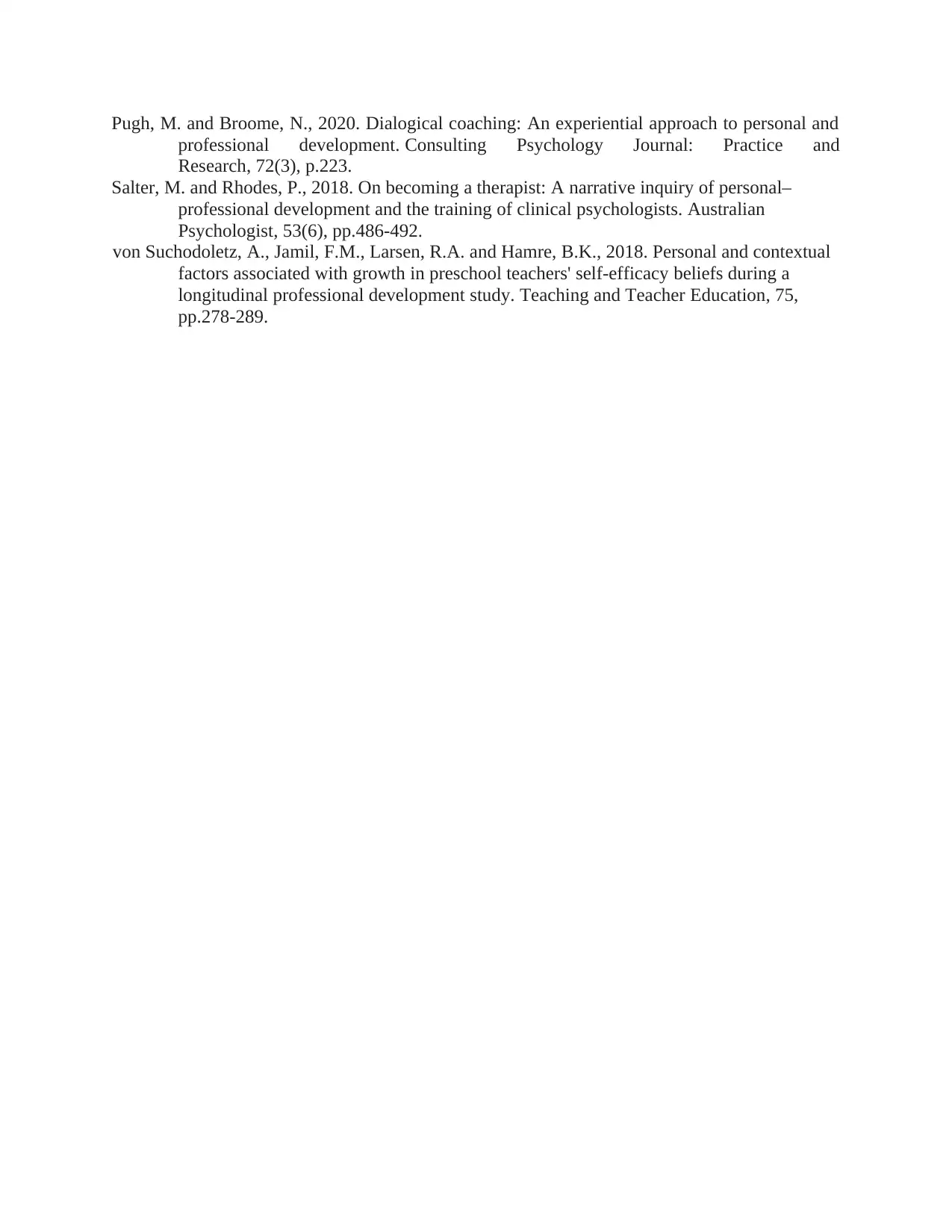
Pugh, M. and Broome, N., 2020. Dialogical coaching: An experiential approach to personal and
professional development. Consulting Psychology Journal: Practice and
Research, 72(3), p.223.
Salter, M. and Rhodes, P., 2018. On becoming a therapist: A narrative inquiry of personal–
professional development and the training of clinical psychologists. Australian
Psychologist, 53(6), pp.486-492.
von Suchodoletz, A., Jamil, F.M., Larsen, R.A. and Hamre, B.K., 2018. Personal and contextual
factors associated with growth in preschool teachers' self-efficacy beliefs during a
longitudinal professional development study. Teaching and Teacher Education, 75,
pp.278-289.
professional development. Consulting Psychology Journal: Practice and
Research, 72(3), p.223.
Salter, M. and Rhodes, P., 2018. On becoming a therapist: A narrative inquiry of personal–
professional development and the training of clinical psychologists. Australian
Psychologist, 53(6), pp.486-492.
von Suchodoletz, A., Jamil, F.M., Larsen, R.A. and Hamre, B.K., 2018. Personal and contextual
factors associated with growth in preschool teachers' self-efficacy beliefs during a
longitudinal professional development study. Teaching and Teacher Education, 75,
pp.278-289.
1 out of 8
Related Documents
Your All-in-One AI-Powered Toolkit for Academic Success.
+13062052269
info@desklib.com
Available 24*7 on WhatsApp / Email
![[object Object]](/_next/static/media/star-bottom.7253800d.svg)
Unlock your academic potential
Copyright © 2020–2026 A2Z Services. All Rights Reserved. Developed and managed by ZUCOL.





